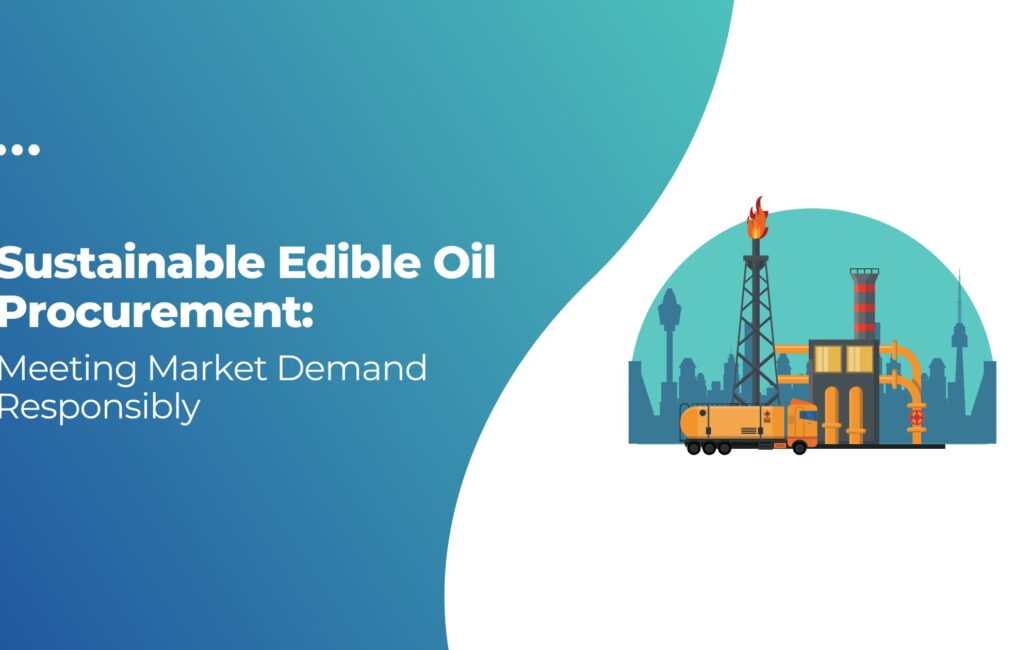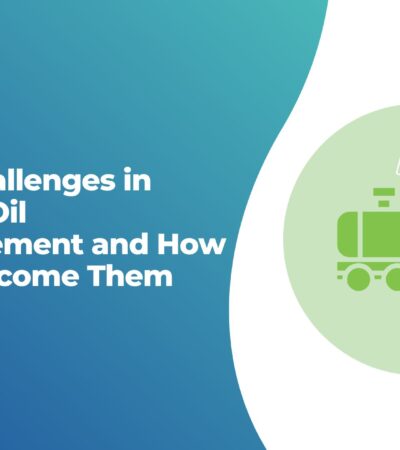Sustainable Edible Oil Procurement: Meeting Market Demand Responsibly

Edible oils are one of the most essential commodities in the global food industry. They are used not only in cooking but also in food processing, pharmaceuticals, cosmetics, and even biofuel production. With global populations growing and dietary patterns changing, the demand for edible oil continues to rise each year. India, for example, consumes more than 23 million tonnes of edible oils annually and imports nearly 14–15 million tonnes to bridge the gap between demand and local production. Oils such as refined corn oil, expeller corn oil, refined rice bran oil, refined sunflower oil, and refined soybean oil play a major role in meeting this demand.
However, this growing demand creates challenges. Sourcing and procuring edible oils in bulk comes with responsibilities. Companies must think beyond price and focus on sustainability, traceability, and reliability. Sustainable edible oil procurement is no longer just a corporate buzzword—it has become an urgent requirement to ensure food security, protect the environment, and maintain stable supply chains.
In this blog, we will explore the challenges of edible oil procurement, why sustainability matters, and how businesses can adopt responsible strategies while meeting rising market demand.
Why Edible Oil Procurement Matters Today
Edible oil procurement is the process of sourcing, purchasing, and managing oil supplies for industrial, commercial, and retail purposes. In the past, procurement teams focused mainly on price negotiations and supplier availability. Today, the scenario has changed.
Several factors have made procurement more complex:
- Global Supply Chain Disruptions – Events like the COVID-19 pandemic, wars, and trade restrictions have shown how fragile global edible oil supply chains can be. For example, the Russia-Ukraine war disrupted sunflower oil exports, creating ripple effects worldwide. (You can read more about these disruptions in our detailed blog on Navigating Global Supply Chains: How to Secure Reliable Refined Sunflower Oil Sourcing).
- Changing Consumer Preferences – Customers are becoming more health-conscious. This increases demand for oils like refined rice bran oil and refined corn oil, which are considered healthier options.
- Sustainability Concerns – Unsustainable farming practices, deforestation for palm oil, and overuse of resources have created global pressure for greener, ethical procurement.
- Regulatory Compliance – Governments worldwide are tightening food safety and sustainability regulations, making procurement a more strategic function.
Procurement is no longer about “who can deliver cheapest.” It is about who can deliver responsibly, reliably, and at scale.
Rising Global Edible Oil Demand
Global demand for edible oil is growing faster than ever. A few factors driving this growth include:
- Population Growth – More people means more cooking, food processing, and packaged foods.
- Urbanization – With rapid urban lifestyles, there is a higher demand for ready-to-eat and fried foods, increasing oil consumption.
- Diversified Usage – Beyond food, edible oils are now used in cosmetics, pharmaceuticals, and biodiesel production.
- Health Trends – Oils like refined sunflower oil and refined soybean oil are preferred due to their health benefits.
For instance, the Indian edible oil market alone is expected to grow significantly in the coming years due to both rising consumption and diversification. To meet this growing demand responsibly, procurement managers must focus on long-term strategies.
For additional insights on global buyer behavior, refer to our blog Why Global Buyers Trust Indian Edible Oil Suppliers for Bulk Procurement.
The Challenges in Sustainable Edible Oil Procurement
Sourcing edible oil sustainably comes with unique challenges:
1. Supply Chain Risks
Edible oil supply chains are global. Sunflower oil may come from Ukraine, soybean oil from Brazil, and palm oil from Indonesia. Any geopolitical tension, natural disaster, or export restriction directly affects supply. Without proper risk management, buyers face delays, cost increases, and inconsistent quality.
To learn more about managing risks effectively, you can read our article on A Step-by-Step Guide for Effective Supplier Risk Management.
2. Environmental Concerns
Many edible oils are linked to deforestation, over-farming, and excessive water usage. For example, palm oil plantations in Southeast Asia have long been criticized for environmental damage. Companies must balance sourcing affordable oils with minimizing ecological impact.
3. Price Volatility
Edible oil prices fluctuate based on harvest cycles, weather conditions, and global trade policies. In 2022, edible oil prices spiked sharply due to supply chain disruptions. Procurement teams need strategies to stabilize costs without compromising quality.
4. Quality and Safety Standards
Bulk edible oil buyers, especially in food, pharma, and cosmetic industries, must comply with strict quality standards. Poor-quality oils can damage brand reputation and even risk consumer health.
5. Meeting Diverse Market Demands
Different industries demand different oil specifications. For example, refined corn oil is used in food frying, expeller corn oil is often preferred for healthier processing, while refined rice bran oil is popular for cooking due to its stability. Procurement teams must source multiple oils that meet unique industry requirements.
Why Sustainability Should Be a Priority
Sustainability in edible oil procurement is about ensuring that today’s sourcing practices do not compromise future generations’ ability to access these oils.
Here’s why sustainability should be a top concern for procurement teams:
- Environmental Impact – Sustainable sourcing minimizes deforestation, soil erosion, and excessive carbon emissions.
- Brand Image – Consumers increasingly prefer brands that care about the planet. Choosing responsibly sourced oils builds trust and loyalty.
- Regulatory Compliance – Governments are introducing stricter norms on environmental and food safety standards. Sustainable procurement ensures compliance and avoids penalties.
- Long-Term Supply Security – Overexploitation of resources leads to supply shortages. Sustainability ensures consistent supply for the future.
For companies in the edible oil sector, ignoring sustainability is no longer an option—it is a business risk.
Procurement Strategies for Responsible Sourcing
How can procurement managers meet rising edible oil demand while being responsible? Here are a few strategies:
1. Building Strong Supplier Relationships
Procurement should move from transactional buying to strategic partnerships. Working closely with suppliers helps ensure traceability, consistent quality, and sustainability practices. Long-term relationships also help in negotiating better terms and securing priority supply during shortages.
2. Diversifying Supply Sources
Relying on a single source or region is risky. By diversifying suppliers across countries and oil types—like balancing between refined soybean oil, refined sunflower oil, and refined rice bran oil—companies can reduce dependence on one commodity or geography.
3. Leveraging Technology
Digital tools like blockchain, AI-driven analytics, and IoT sensors are transforming procurement. They ensure traceability of edible oil batches, monitor quality in real-time, and forecast demand accurately.
If you want to explore how procurement technology is transforming industries, check out our blog How B2B Chemical Suppliers in India Are Transforming Global Supply Chains.
4. Promoting Sustainable Farming
Procurement companies can work with suppliers who invest in sustainable farming methods, such as crop rotation, reduced pesticide usage, and water conservation. This approach helps reduce the negative impact on the environment while ensuring long-term oil availability.
5. Focusing on Quality Certifications
Working only with suppliers who have international certifications like ISO, HACCP, or RSPO (Roundtable on Sustainable Palm Oil) helps ensure compliance with global food and sustainability standards.
Case Studies: How Businesses Are Meeting Edible Oil Demand Responsibly
To understand how sustainable procurement works in practice, let’s look at a few industry examples that highlight challenges and solutions.
1. The Sunflower Oil Shortage During the Russia-Ukraine War
Ukraine is one of the largest producers of sunflower oil, accounting for almost half of global exports. When the Russia-Ukraine conflict started in 2022, exports were disrupted, creating a worldwide shortage. Prices of edible oils spiked sharply, forcing companies to search for alternatives.
Businesses that had diversified procurement strategies were able to adapt by switching to other oils like refined soybean oil or refined rice bran oil. This proved how crucial it is for procurement teams to avoid overdependence on a single oil or geography.
You can explore more about such market shifts in our blog Why Global Buyers Trust Indian Edible Oil Suppliers for Bulk Procurement.
2. The Rise of Health-Conscious Oils
In India, consumer demand for healthier oils such as expeller corn oil and refined rice bran oil has been growing. Procurement teams in food manufacturing industries responded by sourcing more of these oils. By aligning procurement strategies with consumer health trends, businesses gained a competitive edge.
This case shows the importance of monitoring market behavior and adjusting sourcing strategies accordingly.
3. Corporate Commitment to Sustainability
Several global food companies have committed to sourcing only sustainable palm oil, soybean oil, and sunflower oil. They work directly with certified suppliers, use technology to trace their supply chains, and invest in local farmer training programs.
Such strategies help protect ecosystems while also meeting customer expectations for ethical sourcing.
Innovation in Edible Oil Procurement
Procurement is no longer a manual, traditional process. Businesses are now adopting modern tools and innovations to make sourcing smarter, safer, and more sustainable.
1. Blockchain for Traceability
Blockchain allows procurement managers to trace every batch of edible oil—from the farm to the factory. This ensures transparency and reduces the risk of fraud or quality issues.
For example, a food company using blockchain can verify whether its refined sunflower oil supplier follows sustainable practices, giving both businesses and consumers confidence.
2. Artificial Intelligence for Forecasting
AI can analyze global data such as crop reports, weather changes, and trade restrictions to forecast edible oil demand and pricing trends. Procurement teams can use this information to make smarter buying decisions.
3. IoT in Quality Monitoring
Internet of Things (IoT) devices are now being used in storage and transportation of edible oils. Sensors can monitor temperature, humidity, and quality parameters, ensuring that oils like refined soybean oil or refined corn oil maintain their integrity throughout the supply chain.
4. Digital Procurement Platforms
Cloud-based platforms help businesses connect with multiple suppliers, compare prices, and ensure compliance with certifications. This saves time and creates a more competitive, transparent procurement process.
For more insights into how technology is reshaping procurement, read our blog How B2B Chemical Suppliers in India Are Transforming Global Supply Chains.
The Role of Certifications in Building Trust
As sustainability becomes central to procurement, certifications play a big role in ensuring that oils meet quality and ethical standards. Some of the important certifications include:
- ISO 22000 – Food safety management systems.
- HACCP (Hazard Analysis Critical Control Point) – Identifies and controls food safety hazards.
- RSPO (Roundtable on Sustainable Palm Oil) – Ensures palm oil is sourced sustainably.
- Non-GMO Certification – Guarantees oils are free from genetically modified organisms.
When procurement teams choose certified suppliers, they reduce risks, build consumer trust, and maintain compliance with international markets.
Future Outlook of Sustainable Edible Oil Procurement
Looking ahead, edible oil procurement will face both opportunities and challenges. Businesses must prepare for:
1. Growing Demand in Emerging Economies
Countries like India, China, and African nations will see the sharpest increase in edible oil demand. Procurement strategies must focus on securing long-term supply contracts to meet this demand.
2. Shift Toward Healthier Oils
Consumers are moving away from saturated fats toward healthier oils. Oils like refined rice bran oil, refined sunflower oil, and expeller corn oil are likely to see higher demand in the coming years. Procurement teams must plan sourcing strategies around these shifts.
3. Stronger Sustainability Regulations
Governments and global organizations will continue to tighten rules around environmental impact, food safety, and ethical sourcing. Businesses that adopt sustainability early will face fewer disruptions in the future.
4. Local Sourcing and Self-Sufficiency
Countries that rely heavily on edible oil imports may increase local production to reduce dependence. This trend could open opportunities for procurement companies to collaborate with domestic producers.
5. Technology-Driven Procurement
Digital tools, automation, and AI will dominate procurement operations. Companies that fail to adopt these innovations may struggle to remain competitive.
Actionable Steps for Businesses
If you are a food manufacturer, retailer, or procurement manager, here are some practical steps to make your edible oil procurement more responsible:
- Diversify Oils and Suppliers – Don’t rely on a single supplier or oil type. Balance your supply between refined soybean oil, refined sunflower oil, refined rice bran oil, and corn oil.
- Verify Certifications – Work only with certified suppliers to ensure quality and sustainability compliance.
- Invest in Technology – Use digital platforms, blockchain, and AI to track, forecast, and manage procurement efficiently.
- Build Supplier Partnerships – Move beyond short-term price negotiations and build long-term trust-based relationships.
- Monitor Consumer Trends – Stay updated on market shifts toward healthier and sustainable oils.
- Promote Sustainability in Contracts – Include sustainability clauses in procurement contracts to ensure responsible sourcing.
- Plan for Risks – Create backup supply chains to manage disruptions like climate change, trade barriers, or geopolitical conflicts.
How Neshiel Agrochem Adds Value
At Neshiel Agrochem, we understand that procurement is more than just buying edible oil—it’s about ensuring quality, reliability, and sustainability. Our expertise in sourcing refined corn oil, expeller corn oil, refined rice bran oil, refined sunflower oil, and refined soybean oil helps global buyers secure consistent supplies responsibly.
Our strong supplier network, compliance with international standards, and commitment to sustainable practices make us a trusted procurement partner.
For example, in our blog Top Challenges in Edible Oil Procurement and How to Overcome Them, we explored in detail how procurement managers can navigate common issues while working with partners like us.
Conclusion
The edible oil industry is evolving rapidly. Rising demand, environmental concerns, and supply chain risks have made procurement a strategic function that goes far beyond simple buying. Sustainable edible oil procurement ensures businesses meet today’s demand without harming tomorrow’s resources.
By adopting innovative technologies, building strong supplier relationships, and focusing on sustainability, procurement teams can ensure steady supplies of oils like refined corn oil, refined rice bran oil, refined sunflower oil, and refined soybean oil.
Responsible procurement is not just good for the planet—it is also good for business.



